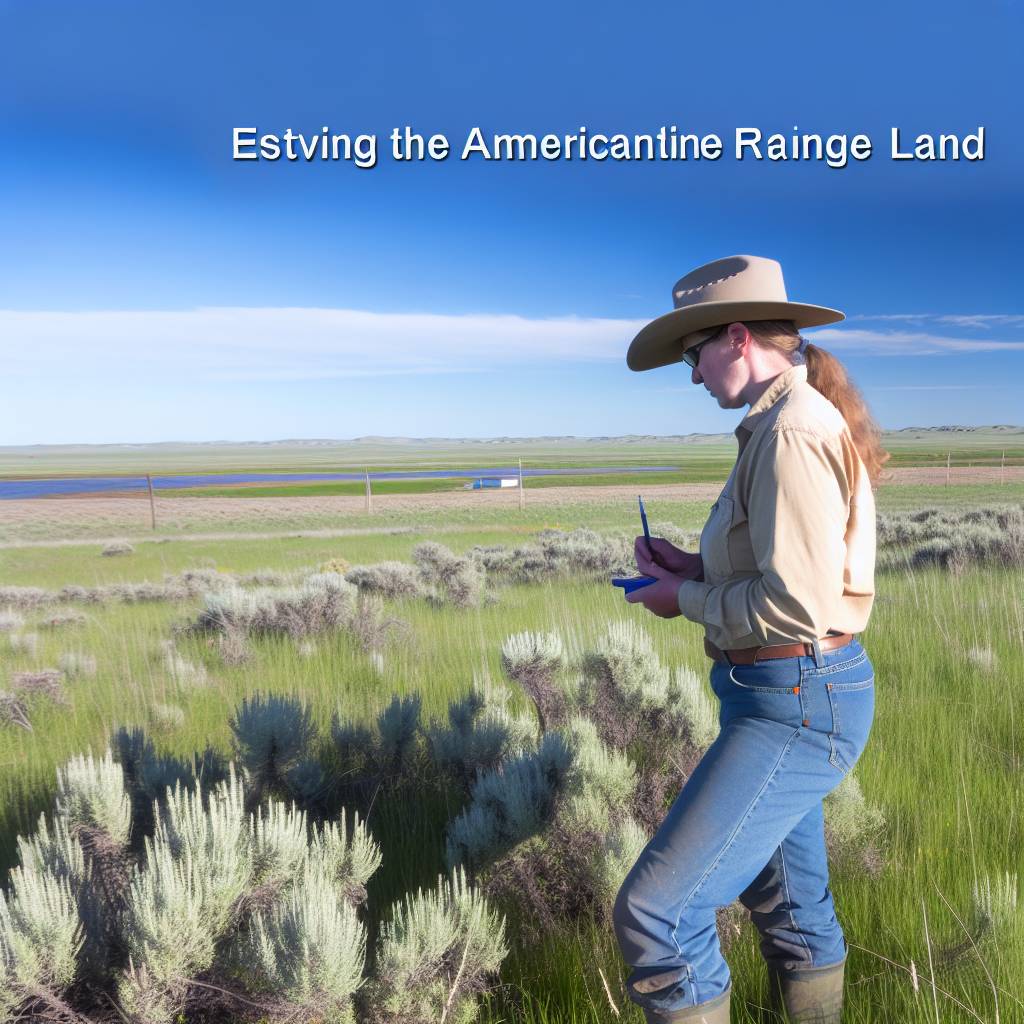Understanding the Role of a Rangeland Manager
Rangeland managers oversee and maintain vast landscapes used for grazing livestock and wildlife habitats.
They play a vital role in ensuring the sustainability of ecosystems and preserving natural resources.
Education Requirements for Aspiring Rangeland Managers
A bachelor’s degree in range management, ecology, or related field is typically required.
Hands-on experience through internships and fieldwork is invaluable for gaining practical skills.
Graduate studies like a master’s degree can provide specialized knowledge in rangeland management.
Continuing education and certifications are crucial for staying updated on industry practices.
Path to Success as a Rangeland Manager
Seek mentorship from experienced professionals in the field to gain valuable insights.
Develop strong communication, problem-solving, and critical thinking skills to navigate complex landscapes.
Network with industry organizations and participate in conferences to expand your knowledge base.
Apply for entry-level positions in rangeland management to start building your career.
Building a Career in Rangeland Management
Becoming a successful rangeland manager requires a combination of education, experience, and dedication.
By following the educational path outlined and continuously honing your skills, you can make a positive impact on the environment.
Research and Understand the Role of a Rangeland Manager:
Aspiring rangeland managers must have a deep understanding of the role they will be stepping into.
By researching and gaining a solid grasp of what this position entails, individuals can better prepare themselves for a successful career in rangeland management.
Responsibilities and Duties of a Rangeland Manager:
- Develop and implement land management plans.
- Monitor and assess rangeland conditions.
- Oversee grazing programs and livestock management.
- Coordinate conservation efforts and habitat restoration.
- Collaborate with stakeholders and government agencies.
Rangeland managers are responsible for the sustainable management of vast landscapes.
They ensure that these lands are properly cared for and utilized.
This involves creating plans to enhance the health of the land, monitoring its condition, and working towards the conservation of natural resources.
Skills and Knowledge Required for the Job:
- Strong understanding of ecosystems and natural resource management.
- Ability to interpret and apply environmental laws and regulations.
- Excellent communication and interpersonal skills.
- Proficiency in data analysis and GIS software.
- Experience with range monitoring techniques and vegetation assessments.
To excel as a rangeland manager, individuals must possess a diverse set of skills and knowledge.
This includes a solid foundation in ecology, an understanding of regulatory frameworks, and the ability to effectively communicate and collaborate with various stakeholders.
Additionally, proficiency in technical tools and monitoring techniques is crucial for success in this field.
Transform Your Career Today
Unlock a personalized career strategy that drives real results. Get tailored advice and a roadmap designed just for you.
Start NowObtain a Bachelor’s degree in a related field:
- Consider majors like range management, ecology, or environmental science.
- Gaining foundational knowledge in natural resource management is crucial.
Earning a Bachelor’s degree in a related field is the first step towards becoming a successful rangeland manager.
This educational path provides individuals with the necessary skills and knowledge to effectively manage and conserve rangeland ecosystems.
Here are the recommended majors that aspiring rangeland managers should consider:
Range Management:
Range management is a specialized field that focuses on the sustainable management of rangeland resources.
This major provides students with a comprehensive understanding of range ecosystems, grazing management, and land rehabilitation techniques.
By studying range management, individuals can develop the expertise needed to address the complex challenges facing rangeland environments.
Ecology:
Ecology is a scientific discipline that explores the interactions between organisms and their environment.
A major in ecology equips students with the knowledge and skills to assess ecosystem health, biodiversity conservation, and ecological restoration practices.
Understanding ecological principles is essential for rangeland managers to make informed decisions about land management strategies.
Environmental Science:
Environmental science is an interdisciplinary field that examines the impact of human activities on the natural world.
By pursuing a major in environmental science, individuals can gain insights into environmental policy, natural resource conservation, and sustainable land use practices.
This background is valuable for rangeland managers who need to balance conservation goals with agricultural production.
Why is gaining foundational knowledge in natural resource management important?
- Understanding the principles of natural resource management is essential for effective rangeland stewardship.
- By acquiring a solid foundation in this field, rangeland managers can implement sustainable land management practices.
Obtaining a Bachelor’s degree in a related field is a critical step in the educational path to becoming a successful rangeland manager.
By pursuing majors like range management, ecology, or environmental science, individuals can acquire the knowledge and skills needed to manage rangeland ecosystems effectively.
Additionally, gaining foundational knowledge in natural resource management is key to promoting sustainability and conservation in rangeland environments.
You Might Also Like: Networking Tips for Aspiring Pest Control Advisors
Internships and volunteer opportunities are valuable for aspiring rangeland managers.
Significance of hands-on experience:
- Gain practical skills in managing rangelands
- Networking with professionals in the field
- Apply classroom knowledge in real-world settings
- Develop problem-solving and critical thinking skills
- Understand the challenges and opportunities in rangeland management
Examples of organizations or agencies:
- Bureau of Land Management (BLM): Offers internships in rangeland management
- USDA Natural Resources Conservation Service: Provides volunteer opportunities to work on rangeland projects
- The Nature Conservancy: Offers hands-on experience in preserving rangeland ecosystems
- Rangeland Management Consulting Firms: Provide internships to learn about the business side of rangeland management
- Local Conservation Districts: Offer volunteer programs to work on rangeland restoration projects
Gaining practical experience through internships and volunteer opportunities is essential for aspiring rangeland managers to acquire the skills and knowledge needed to succeed in the field.
Transform Your Career Today
Unlock a personalized career strategy that drives real results. Get tailored advice and a roadmap designed just for you.
Start NowGain More Insights: Using Hands-On Learning in Agricultural Education
Pursue a Master’s Degree for Advanced Knowledge and Expertise:
Obtaining a Master’s degree in rangeland management can significantly enhance career opportunities and specialization in the field.
- Increased Job Opportunities: With a Master’s degree, you are more likely to qualify for higher-level positions in rangeland management, such as rangeland manager or conservation scientist.
- Advanced Knowledge: A graduate degree allows you to delve deeper into complex ecological and environmental concepts, equipping you with advanced skills and in-depth understanding of rangeland ecosystems.
- Enhanced Expertise: Specializing in a particular area related to rangeland management through a Master’s program can help you develop expertise that sets you apart from other candidates in the field.
Potential areas of focus for a Master’s degree in rangeland management:
- Range Ecology: Specializing in range ecology can help you understand the interactions between plants, animals, and the environment in rangeland ecosystems.
- Wildlife Management: Focusing on wildlife management can provide you with the skills to conserve and manage wildlife populations in rangeland areas.
- Land Rehabilitation: Studying land rehabilitation can help you learn techniques to restore degraded rangelands and improve ecosystem health.
- Policy and Planning: Specializing in policy and planning equips you with the knowledge to develop sustainable management strategies for rangeland landscapes.
Pursuing a Master’s degree in rangeland management can open up a world of opportunities for career advancement and specialization in the field, while also allowing you to contribute to the sustainable management of rangeland ecosystems.
Uncover the Details: The Role of GIS in Modern Irrigation Practices
Obtain certifications or licenses:
Highlight the importance of certifications such as Certified Rangeland Manager (CRM).
These credentials can demonstrate expertise and credibility in the field by:
- Showcasing a commitment to professionalism and continuous learning.
- Providing a standardized benchmark for knowledge and skills.
- Enhancing job prospects and career advancement opportunities.
The Certified Rangeland Manager (CRM) certification, offered by the Society for Range Management, is a widely recognized credential in the rangeland management industry.
To obtain CRM certification, candidates must meet education and experience requirements, pass a comprehensive exam, and adhere to a professional code of ethics.
Holding a CRM designation sets individuals apart as knowledgeable and skilled professionals who are committed to upholding high standards in rangeland management.
Other relevant certifications for aspiring rangeland managers may include Range Management Professional (RMP) and Certified Professional in Rangeland Management (CPRM).
Explore Further: Mobile Marketing Strategies for Agricultural Products

Networking with professionals in the industry is a crucial step towards advancing your career in rangeland management.
Below are some important points to consider:
Benefits of Networking
- Networking allows you to learn from experienced professionals in the field.
- It provides access to job opportunities that may not be publicly advertised.
- You can gain valuable insights and advice on how to navigate your career path.
- Networking helps you build a support system of like-minded individuals.
- It allows you to stay updated on industry trends and developments.
Tips for Building Relationships
- Attend industry events, conferences, and workshops to meet professionals in person.
- Utilize social media platforms like LinkedIn to connect with individuals in the field.
- Join professional organizations related to rangeland management.
- Volunteer for projects and initiatives that allow you to collaborate with other professionals.
- Request informational interviews with professionals to learn more about their career journeys.
Remember, networking is not just about making connections, but also about nurturing those relationships over time.
Be proactive in reaching out to professionals, following up after initial conversations, and finding ways to provide value to your network.
By building a strong network of professionals in the rangeland management field, you can enhance your career prospects and gain valuable support along your educational path.
Stay updated on industry trends and advancements:
In the field of rangeland management, it is crucial to stay abreast of industry trends and advancements.
As a Rangeland Manager, your success and effectiveness will greatly depend on your ability to adapt to new practices and technologies.
Therefore, emphasizing the importance of continuous learning and professional development is essential.
Transform Your Career Today
Unlock a personalized career strategy that drives real results. Get tailored advice and a roadmap designed just for you.
Start NowImportance of Staying Informed
Staying updated on industry trends and advancements allows you to remain competitive and relevant in your field.
By continuously learning and improving your skills, you can enhance your decision-making abilities.
You can contribute to the sustainable management of rangelands.
Resources for Staying Informed
To stay informed about the latest developments in rangeland management, there are several resources available for Rangeland Managers to utilize:
- Attend conferences and workshops: These events provide valuable insights into the current trends and best practices in rangeland management.
- Join professional associations: Organizations such as the Society for Range Management offer networking opportunities and access to research and publications.
- Read industry publications: Subscribing to journals and magazines focused on rangeland management can keep you informed about new research and techniques.
- Take online courses: Platforms like Coursera and Udemy offer courses on rangeland management topics to help you expand your knowledge and skills.
- Engage with industry experts: Building relationships with experienced professionals in the field can provide mentorship and guidance on industry trends.
Enhancing Your Skills
In conclusion, staying updated on industry trends and advancements is a critical aspect of becoming a successful Rangeland Manager.
By emphasizing continuous learning and utilizing various resources for staying informed, you can enhance your knowledge and skills.
This will enable you to effectively manage rangeland ecosystems.
Pathway to a Career in Rangeland Management
Entering the field of rangeland management requires a combination of education, experience, and passion for the environment.
Completing a bachelor’s degree in range science, natural resource management, or a related field is essential to gain the foundational knowledge needed for this career.
Additionally, pursuing internships, volunteering, and networking within the industry can provide valuable experience and connections that will help aspiring rangeland managers stand out in the job market.
Continuing education through workshops, certifications, and advanced degrees can also enhance one’s skills and opportunities for advancement in this field.
Ultimately, becoming a successful rangeland manager requires dedication, hard work, and a commitment to sustainable land management practices.
By actively seeking out educational opportunities, gaining hands-on experience, and building a strong professional network, aspiring rangeland managers can increase their chances of achieving their career goals.
It is vital for individuals interested in this field to take proactive steps towards their future.
The demand for skilled rangeland managers continues to grow in response to environmental challenges and the need for sustainable land management practices.
Additional Resources
Rangeland Management Minor – Department of Rangeland, Wildlife …
Influence of forest and rangeland management on anadromous fish …




